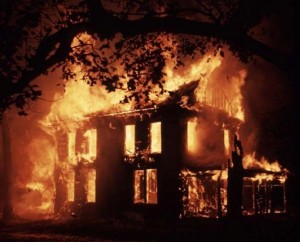Fire Survival Tips and Supplies
It’s three in the morning and you’re deep asleep. Distantly you hear some annoying noise, but shrug it off—you’re just so tired.
But it persists: beep. beep. beep. beep.
By the time to you get fed up and decide to examine the noise, the smoke has filled the room. You can’t even feel the heat of the fire, but the black smoke billowing underneath the door is a dead giveaway.
Sadly, you’re lucky you even woke up.
This was a situation a close friend recently encountered: waking up in the middle of the night to discover their house was on fire. The culprit? A tiny candle downstairs. But fires can start even if you keep care not to allow burning candles in the house: electric fires are the lead cause of fire-starting.
Luckily, my friend jumped from a second-story window and survived. If he had woken up just five minutes later, the story would have ended entirely different. He already couldn’t breathe; his mind was already in the panicked state of survival, unable to process what they remembered from fire survival guides. Did he get low? Did he jump out the window? Did he try to go down the stairs?
Well, that’s why we’re writing this: here’s what you need to know about what happens when a fire starts.
1) First, keep fire alarms in each room of the house. My friend did not have one in his room, or else he probably would have woken up a few minutes earlier. Also, invest in some carbon monoxide monitors. Many fire victims die from carbon monoxide poisoning, without even waking up.
2) Have escape routes mapped out. If you’re in a second-story room, make sure there is something to jump onto from the window. If not, get a collapsible ladder for each of those rooms. That way they can safely leave the room without trekking through the smoky house.
3) Never—and I mean, never—touch a door knob without something to protect your hands. A roommate in that house did; he ended up in the hospital and receiving skin grafts from the burns. But: do keep your door closed when you sleep. This will prevent smoke from billowing into your room when you are asleep. After the fire, we realized that the worst of the damage wasn’t the actual flame, but the smoke. It touched everything.
4) Keep records of all your valuables. It has been over six months since the fire, and the family still has not received their insurance check to replace items like TVs, computers, and the like. Everything was written off in that house! Plus, after a fire, you have to go through and write down the price for everything, including individual books, knick knacks, hair products, and medications.
5) Keep a survival kit inside and outside of the house. Inside for other disasters; outside so that, after a family escapes a fire, they have a way of contacting police, getting their medications (inhalers and the like) while they wait for firefighters to show up. Plus: all medications in a house are considered toxic after a fire. By keeping extra sets outside, you’ll be set to go. Also include a set of clothing, so that you’ll have something to wear that is not infested with smoke. One more thing: include a pre-paid phone. They’re relatively cheap to get today, but can change the difference in fire-response time.
6) This is common sense: have a fire-extinguisher in each room, where it is easily reached and that everyone can find. The difference between life and death is a few seconds. For my friend’s fire, one roommate was able to spray the fire with a hose, helping an eighty-year-old woman escape. It’s the little things that help.
These are the simplest measures to take, but they can make the difference between life and death.








